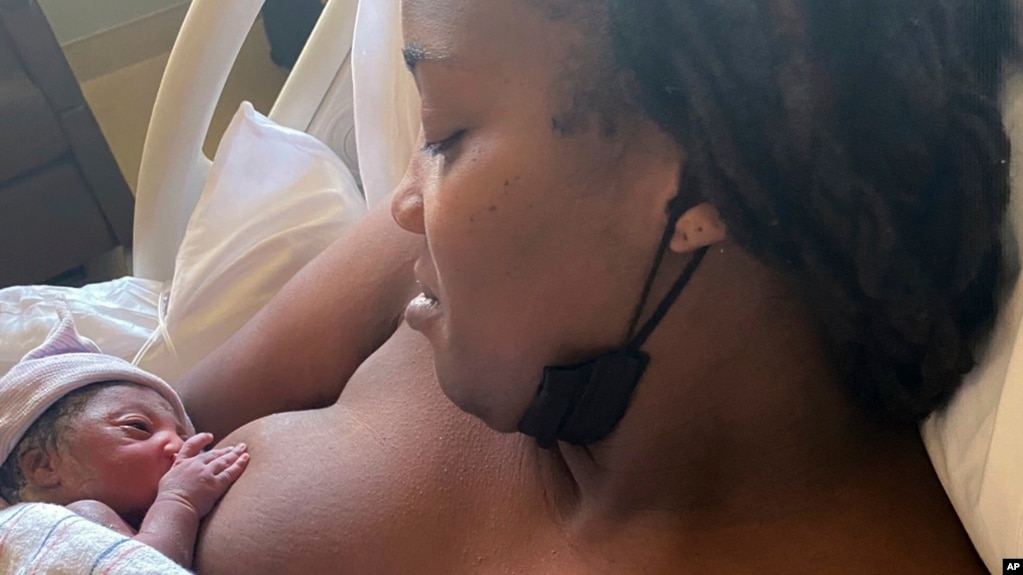HIV感染のママと赤ちゃんに朗報です!!
初乳はママが赤ちゃんにあげる最初の偉大なる贈り物。
よかったですね〜
Doctors’ Group: Mothers with HIV Can Breastfeed
May 27, 2024
A top U.S. pediatricians’ group is making a major policy change about breastfeeding by women with HIV.
The group says women infected with HIV can breastfeed their babies as long as they are taking medications that suppress the virus that causes AIDS.
The new report from the American Academy of Pediatrics (AAP) changes guidance the group had in place since the start of the HIV epidemic in the 1980s.
The group said currently available drugs can reduce the risk of spreading HIV through breast milk to less than one percent, said Dr. Lisa Abuogi. She is a pediatric HIV expert at the University of Colorado and lead writer of the report.
“The medications are so good now and the benefits for mom and baby are so important that we are at a point where it is important to engage in shared decision-making,” Abuogi said.
The drugs are known as antiretroviral therapy. They do not remove all risk of spreading HIV through breast milk. Avoiding breastfeeding is the only sure way to prevent spreading the virus, Abuogi said.
Also, parents must only breastfeed for the babies' first six months. Research shows that switching between breast milk and formula can disrupt an infant's digestion in ways that increase the risk of HIV infection.
About 5,000 people who have HIV give birth in the U.S. each year. Nearly all take drugs to suppress the virus to very low levels, Abuogi said. But viral levels can increase if they do not stay on them.
The medications became widely available starting about 10 years ago. Before then, about 30 percent of HIV infections transmitted from moms to babies occurred during breastfeeding, said Dr. Lynne Mofenson. She is an adviser to the Elizabeth Glaser Pediatric AIDS Foundation. In the early 1990s, about 2,000 infections occurred in U.S. infants each year. Today, it is fewer than 30.
The new AAP policy comes more than a year after government agencies changed their advice. The National Institutes of Health (NIH) and the Centers for Disease Control and Prevention (CDC) changed their recommendations against breastfeeding by people with HIV. The new guidance said people who have viral suppression should be advised about their choices. Those agencies also said that health care providers should not report to child protective services agencies if a parent with HIV seeks to breastfeed.
Research says breastfeeding provides the best nutrition for babies and protects them against sickness and conditions like obesity and type 2 diabetes. Nursing also reduces the mother’s risk of breast and ovarian cancer, diabetes and high blood pressure.
The World Health Organization (WHO) has recommended since 2010 that women with HIV in developing countries breastfeed their infants and have antiretroviral therapy. The guidance weighed the risk of infants getting HIV through breastfeeding and the risk of babies dying from malnutrition, diarrhea and pneumonia. In developing countries, safe replacements for breast milk are often not available.
Dr. Lynn Yee is a Northwestern University women’s health doctor who helped write the NIH guidance. She said experts in developed nations had recommended against breastfeeding. That is because of the wide availability of safe water, formula, and human donor milk, which could remove the risk of HIV infection, Yee added.
That upset people with HIV, who were not given the choice to nurse.
Ci Ci Covin is a 36-year-old from Philadelphia, Pennsylvania. She said she was told she was infected with HIV at age 20. She said she was not permitted to breastfeed her first child, Zion, who is now 13.
Covin said not being able to nurse her son led to postpartum depression. When she became pregnant with her daughter, Zuri, who is now 2-years-old, health care workers helped her breastfeed successfully for seven months. Covin took her medication, and her baby was given drugs to prevent infection.
“Breast milk has everything in it that my baby would need,” Covin said. “That's a beautiful thing.”
Abuogi said the AAP report provides important guidance for pediatricians, nurses and breastfeeding specialists who work with children and families.
Some providers ignored the earlier recommendations and helped women being treated for HIV to nurse their babies. The new guidance should expand such nursing, hopefully quickly, Abuogi said.
Words in This Story
pediatrician — n. a doctor who treats children
benefit — n. a good result that comes from doing a certain thing
engage — v. to carry out or to do
formula –n. artificial mother’s milk
disrupt –v. to interfere with a process or activity
digestion –n. the process of consuming and processing nutrients and removing waste
obesity — n. the condition of being very overweight
nurse –v. to breastfeed a baby
postpartum — adj. taking place after childbirth
医師団: HIV感染の母親、母乳で育てることが可能に
米国のトップ小児科医グループが、HIV感染女性の母乳育児について大きな方針転換を行おうとしています。
同グループによれば、HIVに感染している女性は、AIDSを引き起こすウイルスを抑制する(suppress【səprés】)薬を服用している限り、赤ちゃんに母乳を与えることができると言います。
米国小児科学会(AAP)の新しい報告書は、1980年代のHIV流行開始以来、同学会が実施してきた指針を変更しています。
同団体は現在入手可能な薬剤は、母乳を通してHIVに感染するリスクを1%未満に減少させることが可能であると言っているとリサ・アブオギ博士は述べています。彼女はコロラド大学の小児HIV専門家であり、報告書の主執筆者です。
「現在、薬効は非常に優れており、お母さんと赤ちゃんにとってのメリットも非常に重要であるため、意思決定の共有が重要な段階に来ています」とアブオギ氏は述べています。
この薬は抗レトロウイルス療法として知られています。母乳を通してHIVに感染する全てのリスクを取り除くことはできません。授乳を避けることがウイルス感染を防ぐ唯一の確実な方法なのだ、とアブオギ氏は言います。
また、親が母乳を与えるのは、赤ちゃんの最初の6ヵ月間だけでなければなりません。母乳と粉ミルクformulaを切り替えると、乳児の消化digestionが阻害され、HIV感染のリスクが高まるという研究結果もあります。
米国では毎年約5,000人のHIV感染者が出産しています。ほぼ全員が、ウイルスを非常に低いレベルまで抑制する薬を服用している、とアブオギ氏は言います。しかし、服用を続けなければウイルスレベルは上昇する可能性があります。
この薬は10年ほど前から広く利用できるようになりました。それ以前は、母親から赤ちゃんに感染するHIVの約30パーセントは授乳中に感染していた、とリン・モフェンソン博士は言います。彼女はエリザベス・グレーザー小児エイズ財団の顧問です。1990年代初頭には、米国の乳児に毎年約2,000件の感染が起こっていました。現在では30人以下です。
AAPの新しい方針は、政府機関が助言を変更した1年以上後に発表されました。米国立衛生研究所(NIH)と米疾病対策予防センター(CDC)は、HIV感染者の母乳育児に対する勧告を変更しました。新しいガイダンスでは、ウイルスが抑制されている人は、その選択について助言されるべきであると述べています。これらの機関はまた、HIVに感染した親が母乳で育てようとする場合、医療提供者は児童保護サービス機関に報告すべきではないとしています。
研究では、母乳育児は赤ちゃんに最高の栄養を与え、病気や肥満obesity、2型糖尿病type 2 diabetesなどの症状から赤ちゃんを守るとしています。授乳はまた、母親の乳がんや卵巣がんovarian cancer、糖尿病diabetes、高血圧high blood pressure.のリスクを軽減します。
世界保健機関(WHO)は2010年以降、発展途上国in developing countriesのHIV感染女性に対し、乳児に母乳を与え、抗レトロウイルス療法を受けることを推奨しています。この指針は、母乳育児によって乳児がHIVに感染するリスクと、栄養失調malnutrition、下痢diarrhea、肺炎pneumoniaで乳児が死亡するリスクを天秤にかけたものです。発展途上国では、母乳に代わる安全な薬が入手ができないことが多いのです。
リン・イー博士はノースウエスタン大学の女性保健医で、NIHガイダンスの執筆に協力しました。彼女は、先進国の専門家は母乳育児を推奨していると言います。それは、安全な水、粉ミルク、そしてHIV感染のリスクを取り除くことができるヒトのドナーミルクが広く利用可能であるためである、とイー氏は付け加えています。
これは、授乳する選択肢を与えられなかったHIV感染者を動揺させました。
ペンシルベニア州フィラデルフィアに住む36歳のシー・コーヴィンさん。彼女は20歳のときにHIVに感染していることを告げられたと言います。現在13歳になる最初の子供、シオンに母乳を与えることは許されなかったと言います。
コヴィンさん、息子に授乳できなかったことが産後うつpostpartum depressionにつながったと語りました。現在2歳になる娘のズリちゃんを妊娠したとき、彼女は医療従事者に助けられ、7ヵ月間授乳に成功しました。コヴィンさんは薬を服用し、赤ちゃんには感染を防ぐための薬を飲ませました。
「母乳には赤ちゃんに必要なものがすべて入っています。」「それは素晴らしいことです」とコヴィンさん言います。
アブオギ氏は、AAPの報告書は小児科医、看護師、母乳育児の専門家など、子供や家族に関わる人々に重要な指針を与えていると言います。
以前の勧告を無視し、HIVの治療を受けている女性が赤ちゃんに授乳するのを手助けする医療者もいました。新しいガイダンスは、そのような授乳を、できれば迅速に拡大するものである、とアブオギ氏は述べています。
